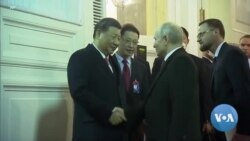The White House says the meeting between the leaders of China and Russia will not help end the war in Ukraine.
Welcome to VOA Asia Weekly. I'm Chris Casquejo in Washington. That story is coming up, but first, making headlines:
Philippine President Ferdinand Marcos Jr. says the locations of four new military bases that will house a rotating crew of U.S troops will be revealed soon. Marcos told reporters in Manila Wednesday that some of the new sites will be in the northern Philippines, which faces Taiwan, and the western Palawan province, along the South China Sea where China is expanding its influence.
South Korea’s military says North Korea fired multiple cruise missiles off its eastern coast Wednesday, the fourth test conducted by North Korea since South Korea and the U.S. began a joint military exercise last week.
The debt-ridden island nation of Sri Lanka has received about $330 million, its president told parliament Wednesday. It’s the first payment in a nearly $3 billion bailout package approved by the International Monetary Fund on Monday.
U.S. President Joe Biden will direct the Commerce Department to consider a new national marine sanctuary designation within 30 days to protect all U.S. waters around the Pacific Remote Islands. If completed, the new sanctuary would help ensure the U.S. reaches Biden's goal to conserve at least 30% of ocean waters under U.S. jurisdiction by 2030. The islands - located between Hawaii and American Samoa - are home to some of the most diverse untouched tropical marine environments in the world --- from coral reefs to volcanic features.
Japanese Prime Minister Fumio Kishida met with Indian PM Narendra Modi in New Delhi Monday where the two agreed to strengthen ties in areas ranging from energy, tourism and in the Indo-Pacific area to counter the influence of China.
As Xi Jinping wrapped up his three-day visit to Moscow, the White House expressed pessimism that the Chinese leader’s talks with Russian President Vladimir Putin will pave the way to ending the war in Ukraine. VOA Chief White House correspondent Patsy Widakuswara has this report.
In Moscow, a red-carpet treatment and state dinner hosted by Russian President Vladimir Putin for Chinese leader Xi Jinping.
“As permanent members of the U.N. Security Council, China and Russia will continue to work with the international community to firmly safeguard the basic norms of international relations based on the purposes and principles of the U.N. Charter.”
Xi called for a diplomatic solution in Ukraine that Putin says he supports.
"We believe that many points of China's peace plan are in sync with Russian approaches and could form a basis for a peaceful settlement, when the West and Kyiv are ready for it. However, we aren't seeing any such readiness on their part yet."
The White House rejected Putin’s claim.
“We haven't seen anything they've said, they put forward, that gives us hope that this war is going to end anytime soon.”
Before the Putin-Xi meeting, the U.S. warned against a Chinese-brokered cease-fire, saying it would ratify Russia’s gains in Ukraine.
The Putin-Xi meeting did not yield a proposal for cease-fire negotiations. John Kirby said the U.S. would only support Beijing-brokered talks if President Volodymyr Zelenskyy believed they would lead to a just peace. For the Ukrainian leader, that means no concessions on territory annexed by Putin.
“I doubt that the Russians would agree to that condition. They've already rejected it as something that they don't regard as any kind of starting point for negotiations.”
Zelenskyy met Tuesday with Fumio Kishida. The Japanese prime minister was the latest leader in the Western alliance to make a surprise visit to Kyiv.
“Given Japan's strength, its leadership in Asia in defending peace and the rules-based international order, and Japan's responsibility as the G-7 chair, our talks today can truly yield a global result.”
After his meeting with Putin, a call between Xi and Zelenskyy may also take place, but that has not been confirmed.
Patsy Widakuswara, VOA News, Washington.
TikTok’s CEO told U.S. lawmakers that the short video-sharing app is committed to user safety, data protection and security, and keeping the platform free from Chinese government influence.
Shou Zi Chew answered questions Thursday from U.S. lawmakers concerned about the social media platform’s effects on its young user base and possible national security risks posed by the app.
“Our approach has never been to dismiss or trivialize any of these concerns. We have addressed them with real action."
Lawmakers have introduced measures that would expand the Biden administration’s authority to enact a national ban.
Visit voanews.com for the most up-to-date stories. Thanks for watching VOA Asia Weekly. I’m Chris Casquejo. Until next week.
We leave you now with the celebration in Tokyo after Japan beat the U.S. in Miami Tuesday to win its third World Baseball Classic title.












